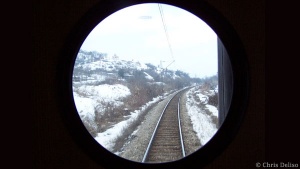Train between Serbia’s and Bosnia’s capitals resumes route after 18-year pause

The once beloved express train between Belgrade and Sarajevo goes back on the rails this weekend, nearly two decades after war disrupted the service.
The rail line, which fell victim to the wars that exploded in Croatia in 1991 and Bosnia in 1992, will be restored “with little fanfare” on December 13, Reuters reported recently.
“The journey,” the publication reported, “will take more than eight hours instead of six due to the many new borders between Serbia, Croatia and Bosnia, and to a dilapidated track worn out by war, neglect and poverty.”
In the 1980s, the “Olympic Express” and the “Bosna Express” were “a showcase of […] Yugoslavia at its best,” a place where the federation’s “state motto of “brotherhood and unity” came alive,” Reuters noted, calling the train “a glimmer of openness, hedonism and carefree multiculturalism amid the lumbering socialist drabness.”
People from the two cities would make the trip regularly, to visit friends and relations or for fun. In those days, Belgrade “was the seat of power, a high-energy treadmill of politics and industry that powered the socialist federation of 24 million people and a dozen ethnic groups,” while Sarajevo was the federation’s cultural capital, “its Ottoman-style café society a façade for a subversive counter-culture of new wave music and uncensored art.”
ADVERTISEMENT
“There was that special bond between Sarajevo and Belgrade not only because of the same language, but because of the same mentality,” Ljilja Kraus, a teacher in Belgrade, told the publication.
But the route, like the relationship between the two cities’ residents, was broken up by the 1990s wars. Now, in an effort to repair the human ties between the two nations, the rail line is being reinstated – an act that rail officials conceded was more political than commercial.
The legacy of war, according to the publication, is still visible along the train’s route, which passes along Croatia’s Vinkovci, once a main rail junction, still scarred by Serb shelling, and the Bosnian towns of Doboj, Samac and Modrica which became infamous for ethnic cleansing and concentration camps.
The train that is to run once a day compared to three times before the war, will provide an alternative to the eight-hour bus ride, which is currently the only transport link between the two cities.
“Some people will be on that train because it’s cheaper, others because of necessity or because the train is more comfortable than a bus. But for sure, some will be on it because they decided to leave their fears and prejudices behind,” Svetozar Pudaric, from Bosnia’s Social Democratic Party who studied at Belgrade University, told Reuters.
“Relations between the two countries will always be burdened with political and economic interests, but ties between people who shared a common living space for nearly 70 years will remain,” he concluded.

